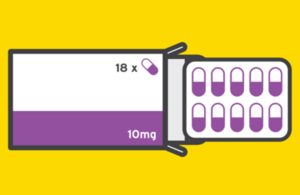Report suspected side effects to help make medicines safer: MHRA launches social media campaign
The Medicines and Healthcare products Regulatory Agency (MHRA) is running a social media campaign between 7-11 November to promote reporting of suspected side effects, as part of an EU-wide awareness week.

Medicine package
Medicines have the potential to harm as well as cure. While they are usually safe and effective, side effects can happen. It is important that the associated risks are understood and communicated to health professionals and patients.
Regulators like MHRA rely on the reporting of suspected side effects to make sure medicines on the market are acceptably safe. Unfortunately, all reporting systems suffer from underreporting, and this is why our campaign is important to both raise awareness and help strengthen the system.
At the centre of the campaign is an animation showing the story of a patient who has a suspected adverse reaction. It shows the medicine being taken, a suspected side effect being experienced, how reports are made by patients or healthcare professionals to the medicines regulator, and how this benefits future patients.
Reporting suspected side effects makes medicines safer
Alongside other safety information, reporting has contributed to the withdrawal of an obesity medicine, the warning that patients taking warfarin should limit or avoid drinking cranberry juice, and, in many EU countries, the advice not to prescribe aspirin to children virtually eliminated cases of Reye’s syndrome, a serious and often fatal condition that causes swelling in the liver and brain.
Mick Foy, group manager for MHRA’s Vigilance and Risk Management of Medicines division said:
The most important part of our work is making sure the medicines you and your family take are effective and acceptably safe.
Our campaign will help the public, patients and healthcare professionals report potential side effects and have confidence that their reports are making a difference.
You can help make medicines safer by reporting any suspected side effects easily and quickly through our Yellow Card Scheme online or via the mobile app.
The campaign is part of the Strengthening Collaboration for Operating Pharmacovigilance in Europe (SCOPE) Joint Action project. One of its main aims is to raise awareness of national reporting systems for suspected side effects in medicines. 22 member states are taking part in the combined cross-European social media campaign.
Notes to Editor
-
National reporting systems for the collection of suspected adverse drug reactions (commonly known as side effects) have acted as early warning systems to help identify numerous important safety issues, many of which were not recognised as being related to a particular medicine until reports were received by medicines regulators. Please find the link to the Yellow Card Scheme.
-
MHRA is responsible for regulating all medicines and medical devices in the UK. All our work is underpinned by robust and fact-based judgments to ensure that the benefits justify any risks. MHRA is a centre of the Medicines and Healthcare products Regulatory Agency which also includes the National Institute for Biological Standards and Control (NIBSC) and the Clinical Practice Research Datalink (CPRD). The Agency is an executive agency of the Department of Health. www.mhra.gov.uk
-
The SCOPE Joint Action project social media campaign is being taken forward through the Heads of Medicines Agencies Working Group for Communications Professionals.
-
The SCOPE Joint Action project aims to support EU member states in the operation of their pharmacovigilance systems which help safeguard public health. It is funded through contributions from European Commission and the involved member states.
-
Case studies include: the former obesity drug rimonabant being withdrawn after new evidence which meant the risks were considered to outweigh any benefits. The interaction between warfarin and cranberry juice - warning issued that patients taking warfarin should limit or avoid drinking cranberry juice, and in many EU countries the advice not to prescribe aspirin to children virtually eliminated cases of Reye’s syndrome, a serious, and often fatal condition, that causes swelling in the liver and brain.
Media enquiries
News centre
MHRA10 South Colonnade
London
E14 4PU
Email newscentre@mhra.gov.uk
Telephone (including out of hours): 020 3080 7651